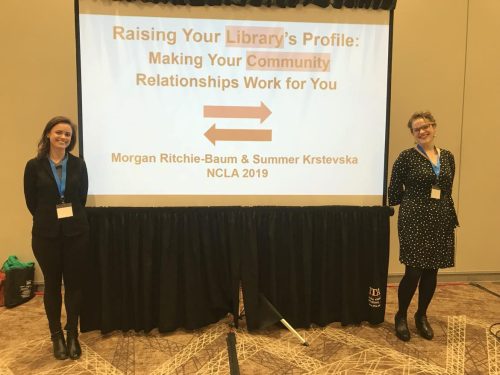When talking with Craig and Hu about unexpected mentoring (see our collaborative post here or Craig’s post about his unexpected reverse mentoring experience with his student assistants here), we discussed other ways we’ve been mentored and the topic of peer mentorship was brought up. I couldn’t help but think of Morgan and I’s relationship and volunteered to write this post. Though Morgan and I have been librarians – and business librarians- for roughly the same amount of time, I have a bit more WFU institutional knowledge, though she is quickly picking up speed and about to bypass me in this area. This inevitably led to me helping or ‘casually mentoring’ Morgan when she started at Wake as she learned to navigate the library, its resources, the business school and the campus itself. One thing I made sure to do at this time, was introduce Morgan to ZSR library colleagues, and other Wake colleagues from the business school and off-campus, that I consider friends and/or mentors. Looking back, though not on purpose, I think this helped emphasize the importance of academic socializing and networking within academia and within the culture of Wake Forest.
Our relationship truly is a back and forth casual peer mentoring situation, and actually what many of you may not know, is that it always has been like this. Morgan and I worked closely together for almost 3 years on the NCLA’s Business Librarians in North Carolina (BLINC) executive board before she started at Wake. Prior to that we joined BLINC at roughly the same time and had plenty of opportunities to get to know each other casually at BLINC events. It’s easy to see that our casual peer mentoring relationship often bridges the personal and the professional. For the point of this blog, I want to point out how this has aided us in being professionally productive while also nourishing our relationship.
Looking back, there have been many moments of peer mentorship. I do think one impactful outcome of our mentoring relationship is that we were able to build up each others’ scholarly identity (and still continue to do so). We’ve taught together, designed courses and worked through pedagogical wins and losses together, we’ve explored new topics together via CAT or other workshops, we’ve had lunch together more times then I can count which has led to many ideas, and actualization, of conference presentations, book chapters and initiatives. We’ve led a professional organization together, planned conferences and workshops together, the list goes on. Often, it was one of our first times doing these things and the other was there to help navigate the situation. *One of Morgan’s first times presenting at a conference was with Summer at NCLA before Morgan worked for Wake Forest! Picture included below. Or, one of us was there to suggest that we should try x, y, z. Though both of us are business librarians with academic and public library experience, we also both have unconventional backgrounds that at times have made us feel like we don’t belong in academia or like we’re imposters. I think this has inevitably allowed us to build trust with each other to be able to effectively challenge and support one another.

When was the last time you felt you were mentored or learned something from each other?
Summer: I’d say almost everyday. Morgan, whether she knows it or not, is constantly showing me ways to be more concise, thoughtful and effective. She also shows me how to be better organized, more prepared and ask good questions. She has a way of making sense of complicated concepts and breaking them down to their simplest form that I could only hope to one day have. For now, I’ll keep practicing!
Morgan: Spoiler alert – I have the same answer! Seriously, pretty much every day. I’ve never had a situation where I have had a colleague who is so openly and genuinely interested and engaged in hearing what I have going on in my day-to-day work and helping me think through obstacles, decisions, and whatever is causing me to furrow my brow in consternation at that moment. Summer and I make a point to schedule two hours on our calendar every Friday to review our week – discuss what’s going on in our liaison areas, scholarly pursuits, committees, classes, and more and where we are experiencing pain points, need help, inspiration, or advice. I will also mention that Summer is totally fearless (at least more fearless than I am) and I can honestly say I would never in a million years have written, published, presented, or taught as much as I have without her pushing me out of my comfort zone.
Your mentoring relationship is causal, how would you say most of the mentoring/learning takes place between you?
Summer: Most of what I learn from Morgan is through observation; listening to her explain what she’s working on, show-up in meetings, teach in class, etc! She likely doesn’t even know. But, I do constantly formally ask Morgan her opinion and/or for her help as well and I learn from her feedback.
Morgan: Does yelling “help me” out my office door while I stare at my computer in frustration count? But in all seriousness, I think the power of a causal mentoring relationship is that you know you can be vulnerable and ask for help or insight whenever or wherever and trust the other person will be there to support you. We definitely have boundaries – we mutually try not to bother each other with work stuff on weekends, vacations, etc.- but I also know I can send Summer an email when I have something I want to think through and she will respond to me when she has the availability. There is definitely a spontaneity to both the time, place, and medium of the mentoring which I think makes it unique.
When do you find yourself turning to the other for guidance, advice, etc?
Summer: One of my favorite things to go to Morgan for is to bounce around ideas. With a little back and forth, we always end up with something fun and the idea is much better than it was originally.
Morgan: I am such an overthinker. When I find myself starting to be paralyzed with indecision or stuck on how I presented or framed something in my class, a paper, a one-shot, etc. I immediately ask Summer for a debrief. Just getting a second set of eyes on the situation helps quiet the anxiety gnomes in my brain and see the situation more clearly.
How is this relationship different from your formal mentoring relationships?
Summer: I’d say because Morgan and I are both business librarians working in the same environment, it’s a situation where we both completely understand each other, who we’re supporting and what the opportunities are. We observe each other’s work constantly, and we’ve seen each other work in different situations, so we know what to expect from each other. This allows for a lot of trust. We have a strong understanding of each others’ strengths and interests. Being on the same team, literally within the business school, but also within RIO, we are very familiar with each others’ goals and help each other achieve them.
Morgan: I mean…ditto! I would also add and highlight that Summer and I have a somewhat atypical background for the positions we find ourselves in at Wake Forest so, whereas with formal mentor relationships where I’m seeking out folks with very different backgrounds, skills, or abilities; Summer and I have been on a very similar journey to business librarianship which means a lot more can go unsaid and we can get to the meat of an opportunity or complication more quickly.
What advice do you have to others who may want to seek out a peer mentoring relationship?
Summer: Look for a friend or colleague whom you admire. You don’t need to formalize a mentoring relationship necessarily, but spend more time with them. Open up, share your goals, ask their advice, observe them doing things that you want to learn how to do or improve on. You might already be in a peer mentoring relationship and not even know it – maybe you’re the mentor! Think about who you learn from and turn to regularly and consider that an opportunity to be more strategic with your relationship. Lastly, but also important, consider how you might bring value to the relationship as well.
Morgan: I think admiration and trust are key here. I admire so much of what Summer has accomplished and is working toward in her career and find that many of her goals compliment my own. Our goals aren’t necessarily the same but somehow, organically, they fit together really well and we provide support, space, and encouragement to the other in achieving those goals. I could see how, in situations like Summer and I’s, where competitiveness could become an issue. But I think we’ve created, and would recommend to others seeking a peer mentoring relationship to create, an environment where individual goals and aspirations are considered, shared, honored, and celebrated openly. Also – don’t share just the hard stuff. Share the stuff that you want to celebrate and laugh about!
Additional Resources:
It’s interesting after reflecting on our mentoring relationship to see that our journey has, and still does, include many of the recommendations listed in the Informal Mentorship as Nourishing Practice chapter in one of our new mentoring resources, Academic Library Mentoring: Fostering Growth and Renewal. This chapter really helped put language to what we’ve experienced and why it has been so impactful professionally.
Question for our colleagues
Have you experienced an impactful casual mentoring or peer mentoring relationship?

7 Comments on ‘A Tale of Informal Peer Mentoring’
This is a very interesting post, Summer. Thank you for sharing! You touch upon important topics that, I feel, most of us have grappled with at one point of our careers (building trust, overcoming imposter syndrome). I wonder if there are ways of building the necessary capacity to facilitate the nurturing of these casual professional synergies in a structured, intentional way… I find this very interesting!
Summer, this is such an uplifting story of unexpected mentoring! Thank you so much for sharing!
I nominate this for best blog post of the year! Loved it.
This is such a great and organic explanation of your unexpected mentoring experiences. You’ve discussed how you got started, how you developed a working (mentoring) relationship and finally how it actually works out. Thanks for what you’ve both said. I know this will positively affect others who read it, and give them future fuel in the mentoring realm!
It is wonderful that the two of you have developed such a collaborative relationship of deep admiration and trust. Building one another up as you each hone your scholarship and professional identities is critical, as that can be intimidating. Thanks for sharing your mentoring experience!
Loved hearing about how this has worked in practice with you! Thinking about it, I think I’ve done this quite a bit within my department – seeing how other people handle different situations or their attitude towards things that I find daunting, they’re able to frame in a more approachable way.
Thanks for sharing the vulnerability and the value of your peer mentoring experience! It is clear that you also have a great deal of trust in each other, and support each other through challenges and triumphs. Congratulations on finding each other to fill this role!